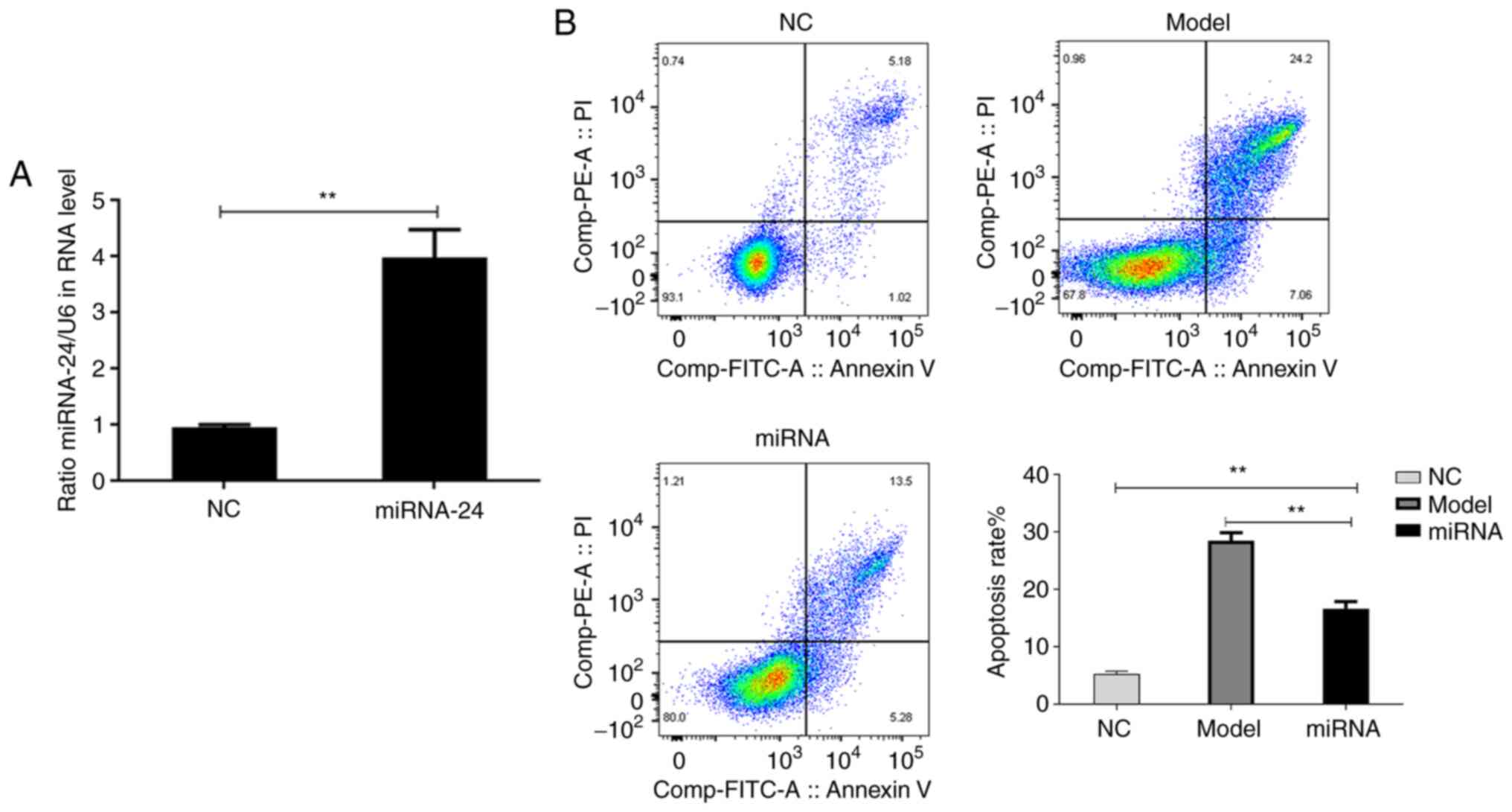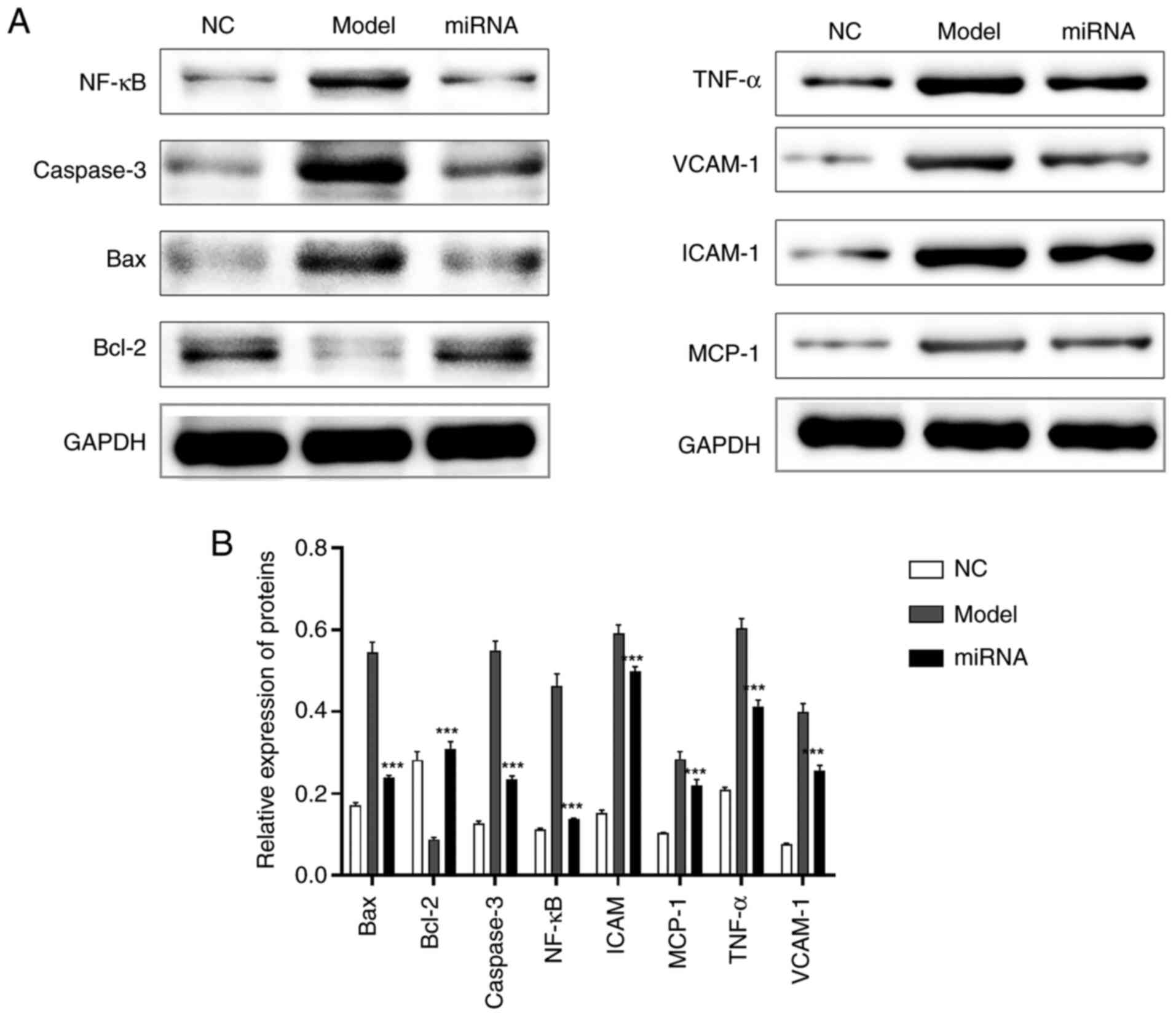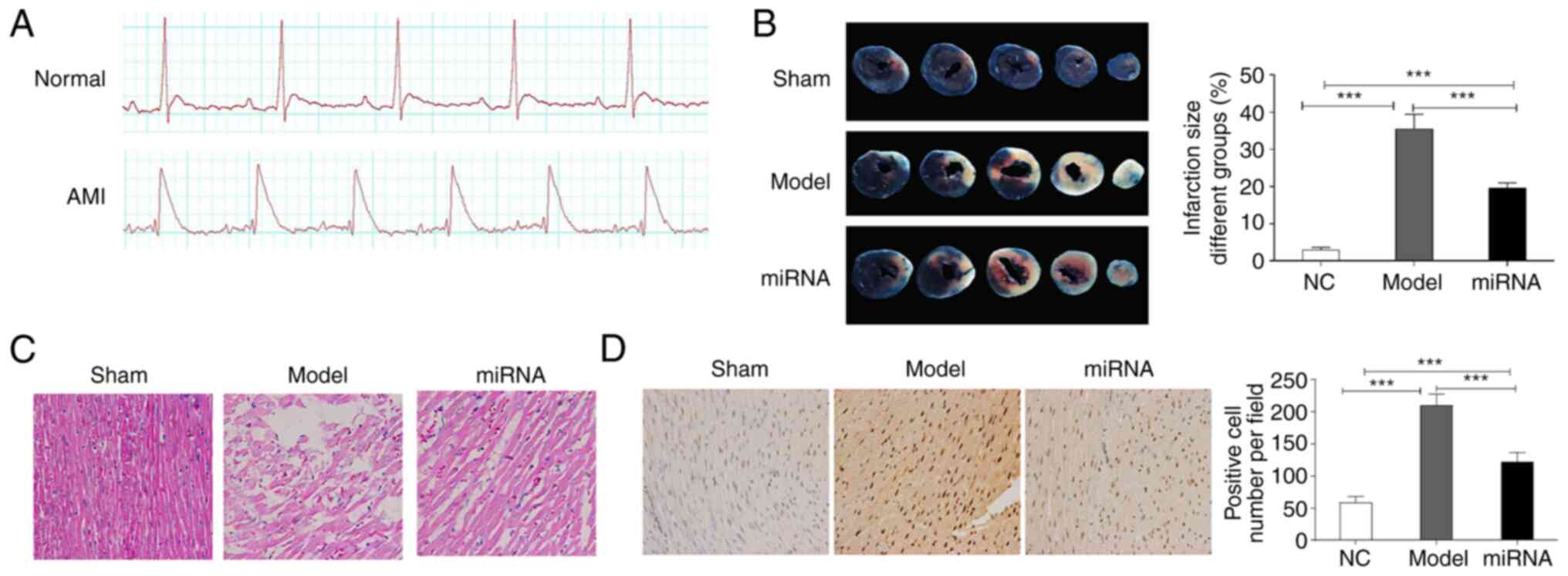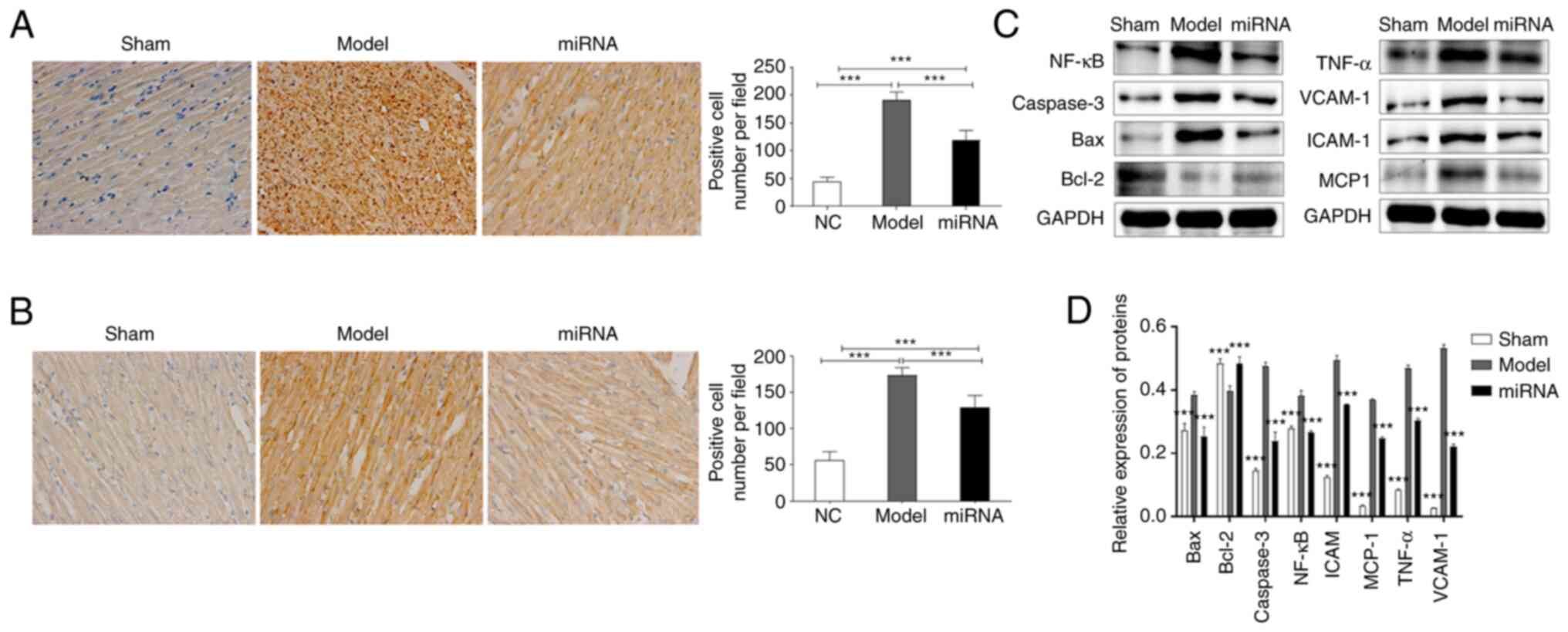|
1
|
Xing J, Xie T, Tan W, Li R, Yu C and Han
X: microRNA-183 improve myocardial damager via NF-κB pathway: In
vitro and in vivo study. J Cell Biochem. 120:10145–10154.
2019.PubMed/NCBI View Article : Google Scholar
|
|
2
|
Kapur NK, Thayer KL and Zweck E:
Cardiogenic shock in the setting of acute myocardial infarction.
Methodist DeBakey Cardiovasc J. 16:16–21. 2020.PubMed/NCBI View Article : Google Scholar
|
|
3
|
Wang J, Lu L, Chen S, Xie J, Lu S, Zhou Y
and Jiang H: PERK Overexpression-mediated Nrf2/HO-1 pathway
alleviates hypoxia/reoxygenation-induced injury in neonatal murine
cardiomyocytes via improving endoplasmic reticulum stress. Biomed
Res Int. 2020(6458060)2020.PubMed/NCBI View Article : Google Scholar
|
|
4
|
Huang XW, Pan MD, Du PH and Wang LX:
Arginase-2 protects myocardial ischemia-reperfusion injury via
NF-κB/TNF-α pathway. Eur Rev Med Pharmacol Sci. 22:6529–6537.
2018.PubMed/NCBI View Article : Google Scholar
|
|
5
|
Halushka PV, Goodwin AJ and Halushka MK:
Opportunities for microRNAs in the crowded field of cardiovascular
biomarkers. Annu Rev Pathol. 14:211–238. 2019.PubMed/NCBI View Article : Google Scholar
|
|
6
|
Zhang CS, Shao K, Liu CW, Li CJ and Yu BT:
Hypoxic preconditioning BMSCs-exosomes inhibit cardiomyocyte
apoptosis after acute myocardial infarction by upregulating
microRNA-24. Eur Rev Med Pharmacol Sci. 23:6691–6699.
2019.PubMed/NCBI View Article : Google Scholar
|
|
7
|
Yang J, Zeng P, Yang J, Liu X, Ding J,
Wang H and Chen L: MicroRNA-24 regulates vascular remodeling via
inhibiting PDGF-BB pathway in diabetic rat model. Gene. 659:67–76.
2018.PubMed/NCBI View Article : Google Scholar
|
|
8
|
Chen Z, Lu S, Xu M, Liu P, Ren R and Ma W:
Role of miR-24, furin, and transforming growth factor-β1 signal
pathway in fibrosis after cardiac infarction. Med Sci Monit.
23:65–70. 2017.PubMed/NCBI View Article : Google Scholar
|
|
9
|
Wang J, Huang W, Xu R, Nie Y, Cao X, Meng
J, Xu X, Hu S and Zheng Z: MicroRNA-24 regulates cardiac fibrosis
after myocardial infarction. J Cell Mol Med. 16:2150–2160.
2012.PubMed/NCBI View Article : Google Scholar
|
|
10
|
Guo C, Deng Y, Liu J and Qian L:
Cardiomyocyte-specific role of miR-24 in promoting cell survival. J
Cell Mol Med. 19:103–112. 2015.PubMed/NCBI View Article : Google Scholar
|
|
11
|
Meloni M, Marchetti M, Garner K,
Littlejohns B, Sala-Newby G, Xenophontos N, Floris I, Suleiman MS,
Madeddu P, Caporali A, et al: Local inhibition of microRNA-24
improves reparative angiogenesis and left ventricle remodeling and
function in mice with myocardial infarction. Mol Ther.
21:1390–1402. 2013.PubMed/NCBI View Article : Google Scholar
|
|
12
|
Long L, Han X, Ma X, Li K, Liu L, Dong J,
Qin B, Zhang K, Yang K and Yan H: Protective effects of fisetin
against myocardial ischemia/reperfusion injury. Exp Ther Med.
19:3177–3188. 2020.PubMed/NCBI View Article : Google Scholar
|
|
13
|
Saddala MS, Lennikov A, Mukwaya A, Yang Y,
Hill MA, Lagali N and Huang H: Discovery of novel L-type
voltage-gated calcium channel blockers and application for the
prevention of inflammation and angiogenesis. J Neuroinflammation.
17(132)2020.PubMed/NCBI View Article : Google Scholar
|
|
14
|
D'Ignazio L, Shakir D, Batie M, Muller HA
and Rocha S: HIF-1β positively regulates NF-κB activity via direct
control of TRAF6. Int J Mol Sci. 21(3000)2020.PubMed/NCBI View Article : Google Scholar
|
|
15
|
Sharma R, Kambhampati SP, Zhang Z, Sharma
A, Chen S, Duh EI, Kannan S, Tso MO and Kannan RM: Dendrimer
mediated targeted delivery of sinomenine for the treatment of acute
neuroinflammation in traumatic brain injury. J Control Release.
323:361–375. 2020.PubMed/NCBI View Article : Google Scholar
|
|
16
|
Krzywonos-Zawadzka A, Franczak A, Sawicki
G and Bil-Lula I: Mixture of MMP-2, MLC, and NOS inhibitors affects
NO metabolism and protects heart from cardiac I/R injury. Cardiol
Res Pract. 2020(1561478)2020.PubMed/NCBI View Article : Google Scholar
|
|
17
|
Deng LC, Alinejad T, Bellusci S and Zhang
JS: Fibroblast growth factors in the management of acute kidney
injury following ischemia-reperfusion. Front Pharmacol.
11(426)2020.PubMed/NCBI View Article : Google Scholar
|
|
18
|
Zhao Z, Tang Z, Zhang W, Liu J, Li B and
Ding S: Inactivated pseudomonas aeruginosa protects against
myocardial ischemia reperfusion injury via Nrf2 and HO-1. Exp Ther
Med. 19:3362–3368. 2020.PubMed/NCBI View Article : Google Scholar
|
|
19
|
Lin F, Xu L, Huang M, Deng B, Zhang W,
Zeng Z and Yinzhi S: β-Sitosterol protects against myocardial
ischemia/reperfusion injury via targeting PPARγ/NF-κB signalling.
Evid Based Complement Alternat Med: Mar 28, 2020 (Epub ahead of
print). doi: 10.1155/2020/2679409.
|
|
20
|
Zhang ZH, Wang YR, Li F, Liu XL, Zhang H,
Zhu ZZ, Huang H and Xu XH: Circ-camk4 involved in cerebral
ischemia/reperfusion induced neuronal injury. Sci Rep.
10(7012)2020.PubMed/NCBI View Article : Google Scholar
|
|
21
|
Wei X, Peng H, Deng M, Feng Z, Peng C and
Yang D: MiR-703 protects against hypoxia/reoxygenation-induced
cardiomyocyte injury via inhibiting the NLRP3/caspase-1-mediated
pyroptosis. J Bioenerg Biomembr. 52:155–164. 2020.PubMed/NCBI View Article : Google Scholar
|
|
22
|
Lv X, Lu P, Hu Y and Xu T: miR-346
inhibited apoptosis against myocardial ischemia-reperfusion injury
via targeting Bax in rats. Drug Des Devel Ther. 14:895–905.
2020.PubMed/NCBI View Article : Google Scholar
|
|
23
|
Ren L, Wang Q, Ma L and Wang D:
MicroRNA-760-mediated low expression of DUSP1 impedes the
protective effect of NaHS on myocardial ischemia-reperfusion
injury. Biochem Cell Biol. 98:378–385. 2020.PubMed/NCBI View Article : Google Scholar
|
|
24
|
Yao B, Wan X, Zheng X, Zhong T, Hu J, Zhou
Y, Qin A, Ma Y and Yin D: Critical roles of microRNA-141-3p and
CHD8 in hypoxia/reoxygenation-induced cardiomyocyte apoptosis. Cell
Biosci. 10(20)2020.PubMed/NCBI View Article : Google Scholar
|
|
25
|
Li X, Yang J, Yang J, Dong W, Li S, Wu H
and Li L: RP105 protects against myocardial ischemia-reperfusion
injury via suppressing TLR4 signaling pathways in rat model. Exp
Mol Pathol. 100:281–286. 2016.PubMed/NCBI View Article : Google Scholar
|
|
26
|
Wang S, Zhao Y, Song J, Wang R, Gao L,
Zhang L, Fang L, Lu Y and Du G: Total flavonoids from Anchusa
italica Retz. Improve cardiac function and attenuate cardiac
remodeling post myocardial infarction in mice. J Ethnopharmacol.
257(112887)2020.PubMed/NCBI View Article : Google Scholar
|
|
27
|
Iwashima T, Kudome Y, Kishimoto Y, Saita
E, Tanaka M, Taguchi C, Hirakawa S, Mitani N, Kondo K and Iida K:
Aronia berry extract inhibits TNF-α-induced vascular endothelial
inflammation through the regulation of STAT3. Food Nutr Res: Aug
16, 2019 (Epub ahead of print). doi: 10.29219/fnr.v63.3361.
|


















